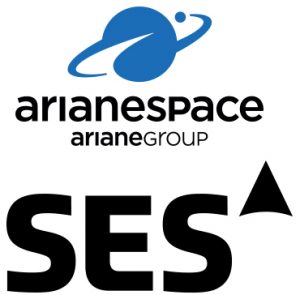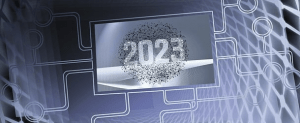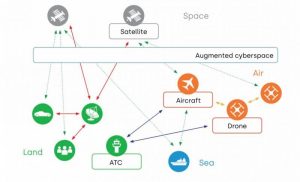Quantum News Briefs December 30: Space Will Be The Driver Of Quantum Innovation; Decent Cybersecurity enters the cybersecurity market with Post-Quantum dCorePQfabric solution; SES Selects Arianespace to launch EAGLE-1 satellite for Europe’s quantum cryptography + MORE

Quantum News Briefs December 30: Space Will Be The Driver Of Quantum Innovation; Decent Cybersecurity enters the cybersecurity market with Post-Quantum dCorePQfabric solution; SES Selects Arianespace to launch EAGLE-1 satellite for Europe’s quantum cryptography + MORE.
*****
Space will be the driver of quantum innovation
 Shelli Brunswick, COO of Space Foundation, recently authored a Forbes article discussing quantum technology and the global space ecosystem. Quantum News Briefs summarizes article below.
Shelli Brunswick, COO of Space Foundation, recently authored a Forbes article discussing quantum technology and the global space ecosystem. Quantum News Briefs summarizes article below.
Brunswick explains the three keys advantages of space that help unlock quantum’s power for advancements.
Cold: Quantum computers function at their best at temperatures nearing absolute zero. That kind of cold is difficult and extremely expensive to produce on Earth, even in frigid polar regions. But outside Earth’s atmosphere, extremely cold temperatures can be achieved by simply providing shade.
Controlled environment: To reach correct answers, quantum computing needs its subatomic parts to function in an interference-free vacuum. That’s another piece that is difficult and expensive to attain on Earth but comparatively simple and cheap in space.
Access to vast streams of data: On Earth, we’d be required to build physical data pipelines to feed voracious quantum machines. By contrast, in space, information flows freely.
Exciting work is happening in Europe, where quantum tech provides secure communications on the ground. Groups led by the European Commission will extend them into space to develop complementary networks of distant nodes. Related; Click here for upcoming IQT The Hague: Europe’s Quantum Communications and Quantum Security event.
Here in the U.S., the ISS National Laboratory is conducting research in space to determine the viability of potential applications. These include “communication solutions (time keeping for banking, GPS), coded satellite-based transmissions (‘quantum cryptography’), and very sensitive sensors for faster computers and improved communications, navigation, and healthcare.”
Click here to read Brunswick’s Forbes article in-entirety.
*****
Decent Cybersecurity enters the cybersecurity market with Post-Quantum dCorePQfabric solution
Decent Cybersecurity image
Decent Cybersecurity announced their entry into the cybersecurity market on December 30 with the launch of dCorePQfabric, a modular software solution developed with funding from the European Space Agency. dCorePQfabric offers post-quantum cryptography, delivering a next-generation turn-key solution for end-to-end data security, auditability, and traceability for satellite operators and ground stations as service providers. Quantum News Briefs summarizes the announcement.
Designed to handle the looming threat of quantum computing and its predicted ability to crack virtually any existing cryptographic keys, dCorePQfabric helps to mediate confidentiality through advanced features and capabilities. After testing dCorePQfabric in various case scenarios, the team is enhancing the product’s capabilities for space surveillance and secure infrastructure communication. dCorePQfabric is one of several cybersecurity products being developed by Decent Cybersecurity, which is part of the Decent Group. Decent family of companies started developing blockchain technology in 2015.
dCorePQfabric offers a versatile design with valuable properties for decentralized Space Traffic Management (STM) involving various stakeholders. The next-generation Identification Friend-or-Foe (IFF) system provides secure identification and operational decision-making capabilities for aircraft, vehicles, and other assets. The dCorePQfabric solution uses a revolutionary post-quantum state recognition algorithm to address the cybersecurity challenges of modern multi-domain ecosystems. It leverages existing onboard computers and programmable radio modems while also providing an additional layer of security for data transfers within the ecosystem (such as GNSS and telemetry).
dCorePQfabric is based on DCore (Dynamic Core Middleware), Decent’s open source blockchain platform that supports developers and businesses in building decentralized applications. DCore was launched in 2017 as the world’s first blockchain platform dedicated to digital content, media, and aerospace and defense. Click here to read complete announcement.
*****
SES Selects Arianespace to launch EAGLE-1 satellite for Europe’s quantum cryptography
The EAGLE-1 satellite, which will support the end-to-end secure Quantum Key Distribution (QKD) system for Europe, will be launched for SES by Arianespace on a Vega C rocket from French Guiana as early as Q4 2024. The satellite will be placed into Low Earth Orbit (LEO). Quantum News Briefs summarizes.
The EAGLE-1 project comprising satellite and  ground infrastructure, is developed by SES and its consortium of 20 European partners, with the European Space Agency (ESA) and the European Commission support.
ground infrastructure, is developed by SES and its consortium of 20 European partners, with the European Space Agency (ESA) and the European Commission support.
Under the agreement with ESA, SES and its partners will design, develop, launch and operate a satellite-based end-to-end QKD system for the purpose of testing and validating space-based secure transmission of cryptographic keys. The first European sovereign space-based QKD system will include the dedicated low earth orbit (LEO) EAGLE-1 satellite and state-of-the-art QKD operations centre in Luxembourg. In the scope of EuroQCI, the EAGLE-1 satellite will enable early access, validation, and integration of space-based QKD for EU Member States.
Following the launch, the EAGLE-1 satellite will complete three years of in-orbit mission supported by the European Commission. During this operational phase, the satellite will allow European Union governments and institutions, as well as critical business sectors, early access to long-distance QKD that would path the way towards an EU constellation enabling ultra-secure data transmissions.
The EAGLE-1 project is co-funded by the ESA contribution of Germany, Luxembourg, Austria, Italy, the Netherlands, Switzerland, Belgium, and the Czech Republic under ARTES, as well as the European Commission through Horizon Europe. Click here to read original release.
*****
2023 will see revolution in innovations in materials for quantum technology
 Jessica Wade, a research fellow at Imperial College’s Faculty of Engineering, predicts in her Wired magazine article that 2023 will see a revolution in innovations in materials for quantum technology. Quantum News Briefs summarizes below.
Jessica Wade, a research fellow at Imperial College’s Faculty of Engineering, predicts in her Wired magazine article that 2023 will see a revolution in innovations in materials for quantum technology. Quantum News Briefs summarizes below.
Currently, quantum technologies rely on materials that are expensive and complicated to prepare, and they often require expensive and bulky cryogenic cooling to operate. Such equipment relies on precious commodities such as liquid helium, which is becoming increasingly costly as the global supply dwindles. 2023 will see a revolution in innovations in materials for quantum, which will transform quantum technologies. Alongside reducing environmental demands, these materials will allow for room-temperature operation and energy saving, as well as being low-cost and having simple processing requirements. To optimize their quantum properties, research labs can manipulate chemical structure and molecular packing.
2023 will see more innovation in the design of materials for quantum technologies. Of the many candidates considered so far (e.g., diamonds with nitrogen vacancy defects, van der Waals/2D materials, and high-temperature superconductors), I’m most excited about the use of molecular materials. These materials are designed around carbon-based organic semiconductors, which are an established class of materials for the scalable manufacture of consumer electronics. We can use chemistry to control their optical and electronic properties, and the infrastructure surrounding their development relies on established expertise.
Recently, the UK Engineering and Physical Sciences Research Council announced a vision for innovation in materials for quantum technologies, led by Imperial College London and the University of Manchester. The London Centre for Nanotechnology—a collaboration of hundreds of researchers across Imperial, King’s and University College London—has considerable expertise in the simulation and characterization of quantum systems. The UK’s home for measurement—the National Physical Laboratory—just opened the Quantum Metrology Institute, a multimillion-pound facility dedicated to the characterization, validation, and commercialization of quantum technologies. Click here to read original article in-entirety.
*****
Sandra K. Helsel, Ph.D. has been researching and reporting on frontier technologies since 1990. She has her Ph.D. from the University of Arizona.






















